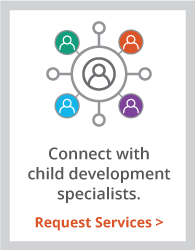Who knows your baby better than you?
You know the difference between a wet-diaper cry and an I’m-hungry cry.
You cheer your baby on and celebrate her progress.
You’re the center of her world.
And you’re the expert when it comes to your child.
But how do you know if your child’s development and growth are on track? Maybe you’re comparing her to another baby the same age who seems more advanced. Should you worry?
This is a common concern whether it’s your first or your fourth child.
At Help Me Grow South Carolina, we believe family-engaged developmental monitoring (FEDM) is an important tool in your child’s growth.
In fact, FEDM is so powerful we believe it should be used to monitor the development of all young children living in South Carolina.

What is family-engaged developmental monitoring?
We understand and celebrate that family looks different in every household.
In this context, family refers to people the child has a personal relationship with and are responsible for their well-being and development.
FEDM is a research-based systems approach to healthy child development. And families are at the center of the entire process.
FEDM is based on three essential traits:
- Families are regarded as the experts on their child’s development.
- Information is gathered to inform a holistic approach to the child’s development.
- Developmental progress and needs are discussed over time.
There are five steps in the FEDM model.
- Developmental promotion: You’ll learn what to expect as your child grows so you can engage them in age-appropriate activities, celebrate milestones, and recognize when there are concerns.
- FEDM: Working with your provider*, together you’ll highlight your child’s progress and identify opportunities for support and education. *Your ‘provider’ is a professional who serves and interacts with your child. This includes medical, education, social service, community-based, faith-based, and other child-serving agencies.
- Developmental and autism screening: You and your provider will complete screenings that highlight your child’s developmental achievements and support the discovery of delays or disabilities. *Screenings can take place when you express a concern or at the suggestion of your provider at recommended ages.
- Referral for services: You’re referred to trusted services to help with your child’s development, health, wellness, and family needs based on your priorities, conversations, or through screening.
- Receipt of services: Your provider will follow up with you to make sure you’ve connected with your support and services and to address any remaining or new priorities you have.
A new referral is made if you haven’t successfully connected with services.
What are the advantages to family-engaged developmental monitoring?
We encourage all South Carolina families to developmentally monitor their young children.
Everyone wins with universal FEDM because it:
- Promotes the celebration of developmental achievements
- Supports the early discovery of delays or disabilities
- Fosters early intervention so children enter school better prepared academically, physically, socially, and emotionally
- Empowers families to advocate for their children
- Nurtures relationships between families and providers
- Elevates family-centered decision making and selection of services for a more inclusive and culturally appropriate experience
How can Help Me Grow South Carolina assist with your child’s developmental monitoring and screening?
First, congratulations on starting this process. Sometimes, new experiences are scary. But we’re here to help and support you.
We offer two resources for developmental monitoring and screening. You can choose either one to get started.
Exploring Developmental Milestones
This valuable resource helps you identify your child’s developmental milestones by age. The printable pages contain developmental information you can use as a checklist.
We suggest you bring the checklist to your provider and lead the conversation about your child’s growth.
There are two ASQ screenings available – ASQ-3 and ASQ: SE-2. Both can be used with children from 1 month to 5½ years old.
ASQ-3 is a screening tool that measures developmental skills in five domains: communication, fine motor, gross motor, problem-solving, and personal-social.
ASQ: SE-2 screens for social and emotional behaviors in seven key behavioral areas: self-regulation, compliance, social communication, adaptive functioning, autonomy, affect, and interaction with people.
We recommend you complete both screenings. Each takes 10-15 minutes to complete. However, if you only have time for one, start with the ASQ-3. When you’re ready, you can complete the ASQ: SE-2.
Regardless of which resource you select, you are the expert on your child’s development.
Your input – what you observe daily with your child – is the starting point in your child’s developmental monitoring.
Remember, FEDM is only possible with you.
Watch this short video describing how Help Me Grow South Carolina can help your child reach their full potential.
Easy access to the ASQ Developmental Screening can be found here.


